Atomic physicist Niels Bohr is famously quoted as saying, “Prediction is very difficult, especially if it’s about the future.” Yet despite years of getting things wrong, magazines love think pieces on where we’ll be in several decades, even centuries in time. It gives us comfort to think great things await us, even though we’re long overdue for the personal jetpack and, based on an Isaac Asimov interview in Omni Magazine that blew my teenage mind, interchangeable genitals.
And yet it’s Asimov who apparently owned the only set of postcards of En L’An 2000, a set of 87 (or so) collectible artist cards that first appeared as inserts in cigar boxes in 1899, right in time for the 1900 World Exhibition in Paris. Translated as “France in the 21st Century,” the cards feature Jean-Marc Côté and other illustrators’ interpretations of the way we’d be living…well, 15 years ago.
The history of the card’s production is very convoluted, with the original commissioning company going out of business before they could be distributed, and whether that company was a toy manufacturer or a cigarette company, nobody seems to know. And were the ideas given to the artists, or did they come up with them on their own? We don’t know.
One of the first things that stands out scanning through these prints, now hosted at The Public Domain Review, is a complete absence of space travel, despite Jules Verne having written From the Earth to the Moon in 1865 (which would influence Georges Méliès’ A Voyage to the Moon in 1902). However, the underwater world spawned many a flight of fancy, including a whale-drawn bus, a croquet party at the bottom of the ocean, and large fish being raced like thoroughbred horses.
There’s a few inventions we can say came true. The “Advance Sentinel in a Helicopter” has been documenting traffic and car chases for decades now, fed right into our televisions. A lot of farm work is now automated. And “Electric Scrubbing” is now called a Roomba.
For a card-by-card examination of these future visions, one should hunt out Isaac Asimov’s 1986 Futuredays: A Nineteenth Century Vision of the Year 2000, which can be found for very cheap on Amazon right now. (Or see the nice gallery of images at The Public Domain Review.) And who knows? Maybe next year, your order will come to your door by drone. Just a prediction.
via Paleofuture
Related Content:
Isaac Asimov’s 1964 Predictions About What the World Will Look 50 Years Later — in 2014
Arthur C. Clarke Predicts the Future in 1964 … And Kind of Nails It
In 1900, Ladies’ Home Journal Publishes 28 Predictions for the Year 2000
Ted Mills is a freelance writer on the arts who currently hosts the FunkZone Podcast. You can also follow him on Twitter at @tedmills, read his other arts writing at tedmills.com and/or watch his films here.
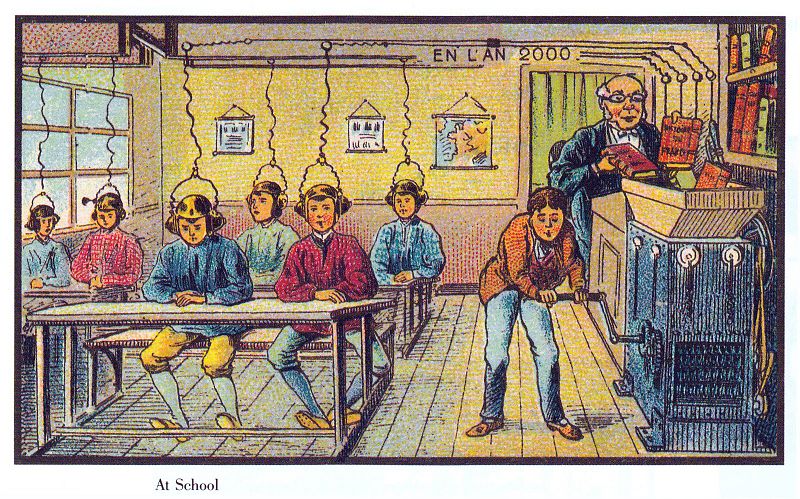
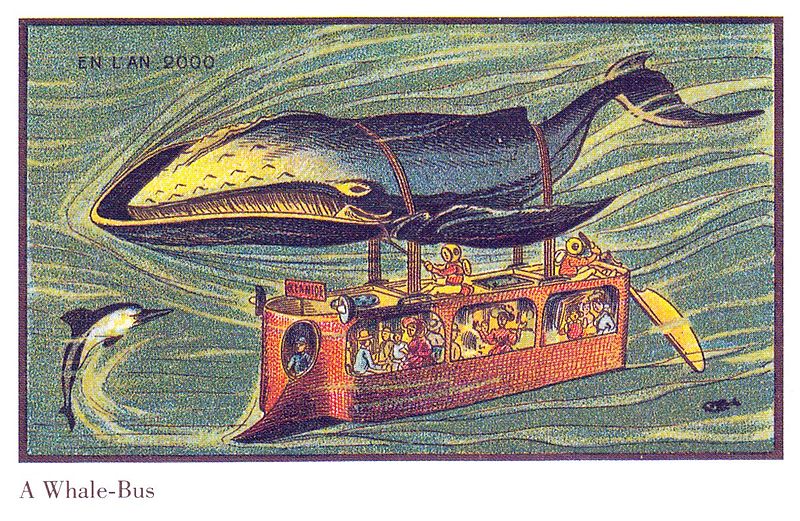

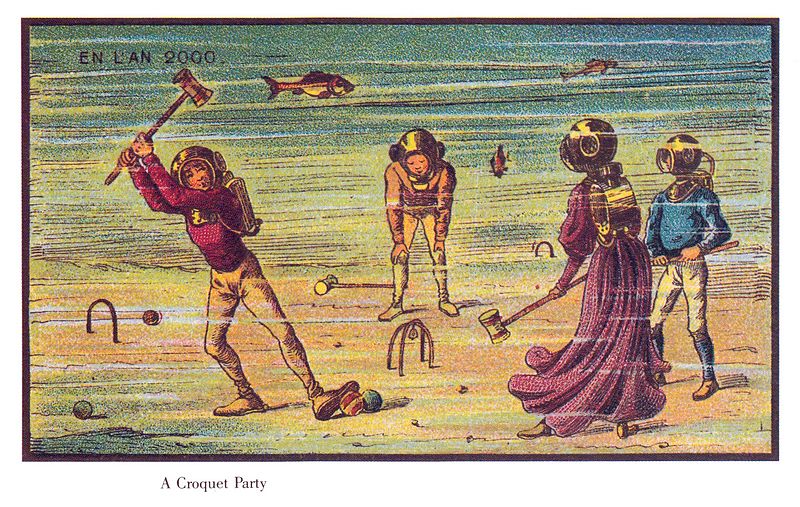
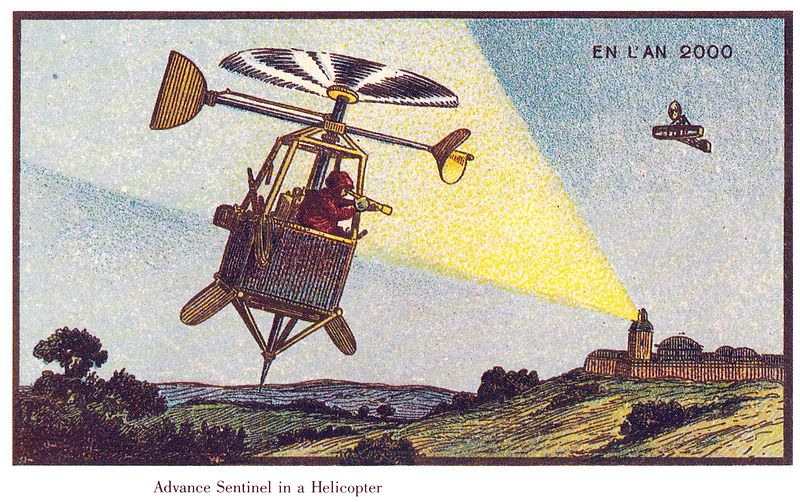
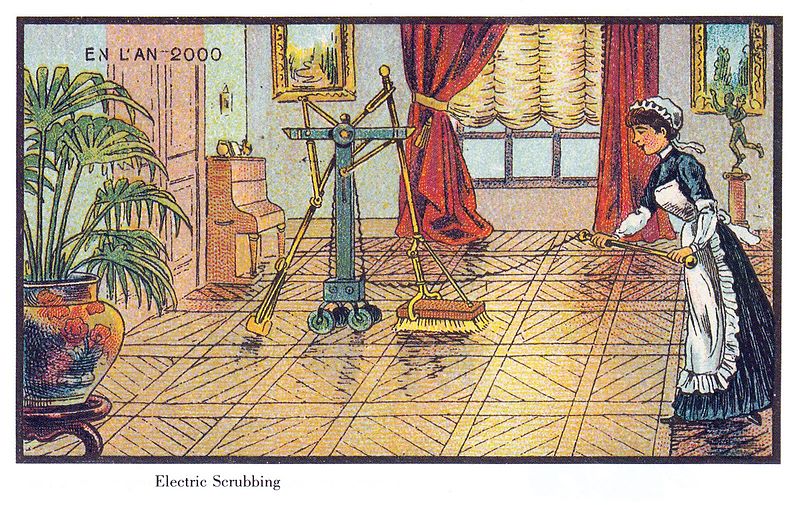


I predict that in the year 3000, futurists will make myriad predictions for the year 4000. (Let’s face it, we are interminably forward focused!)
I think, in this present day, most people are not forward focused and will become hostile if forced to face it.
A deficit of long term thinking has been supplanted with a surplus of short term thinking.
I predict that in five years the phrase “20–20 hindsight” will be run completely into the ground.
I’m sure most are focused on the first image. Notice the shredding of pulp ‚while people have their ears clogged with speakers. That is what prompted me to read article. To have that insight into the future is remarkable.
I believe in respect to air travel ‚DaVinci nailed that in the late fifteenth ‚early sixteenth century .
I think one would have to delve into the history books of the period to see and understand what man was thinking in early nineteenth century .
In respect to the images shown,they all appear to be drawn by the same hand . As these were graphics of a small scale,I’m surprised more of these have not surfaced .
I personally collect vintage French posters, large original limestone lithos from 1890–1900 generally.
I think it safe to say,within five hundred years we ‚rather the future inhabitants of the Earth will have decimated this planet,and man will acclimate to the conditions of Mars,through technology .
I realize five hundreds years appears to be a short period of time,but given how quickly technology is changing the face of this planet,and the idea that humans are destroying the Earth at warp speed,catastrophic things will change the landscape ‚as it were ‚to a degree we may not as yet fathom.
Great article and it has indeed piqued my curiosity …
Let’s face it. There is no excitement in predicting the past is there.
Predicting life based on religion has no satisfying answers as well.
So all there is left is the next game of football and the future right?
Or just predict nothing and go with the flow, i would say..
I lke it
I think we will have antigravity propulsion and light that can be used to pull and push objects.
Or these things will come out of the black budget hole. Why do I say this? Because I know that Hughes Summa Corp. was building an antigravity device in 1972.